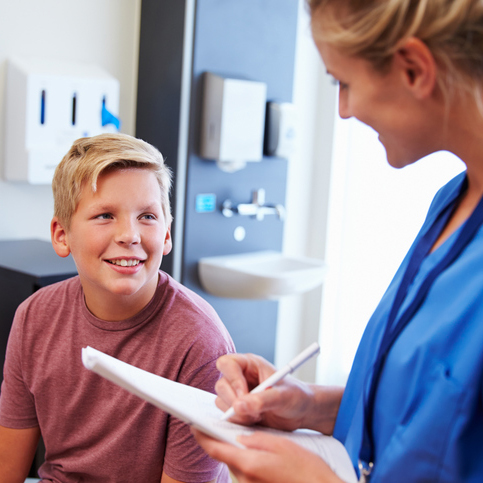 Perhaps you’ve noticed the commercials and advertising with adults describing their cancer developed from human papillomavirus, or HPV. It shows images of these adults getting younger and younger and ends with a question to their parents, “Why didn’t you let me get vaccinated against cancer?”
Perhaps you’ve noticed the commercials and advertising with adults describing their cancer developed from human papillomavirus, or HPV. It shows images of these adults getting younger and younger and ends with a question to their parents, “Why didn’t you let me get vaccinated against cancer?”
These are very dramatic messages, and truthfully speak to the heart of making good parenting decisions. What would you say to your child if they develop a cancer that’s prevented with the HPV vaccine?
“I thought it would make you sexually active”
Research shows that teens who get the HPV vaccine are no more likely to engage in sexual activity as teens who don’t. HPV isn’t just spread through intercourse; it is also transmitted through intimate touching.
“I thought you’d never be exposed to the virus”
HPV is the most common sexually transmitted infection. Nearly everyone who is sexually active will contract at least one type of the 150 strains of HPV at some time in their life.
“I thought you could avoid infected partners”
Sometimes, HPV can cause warts on or near the genitals, but most often, there are no symptoms of HPV infections. Up to 80% of people will test positive for HPV within 3 years of becoming sexually active.
“I thought you would always use a condom”
HPV is transmitted through skin-to-skin contact; condoms don’t cover all the areas that can be infected. When your child is married, it’s very unlikely that he or she will use a condom.
“I thought you could just take an antibiotic”
There is no cure for HPV infections.
“I thought it might not work”
Clinical trials show a nearly 100% protection rate against cervical precancers and genital warts. Even if your child has had intimate contact, the CDC still recommends getting the vaccine, as your child may not have yet been exposed to an HPV strain that could cause cancer.
“I thought cancer had to run in the family”
Nearly all cases of cervical cancer and anal cancer are caused by HPV. HPV can cause cancer of the vagina, vulva and penis. 70% of throat cancer cases are caused by HPV. Last year, about 32,500 cases of cancer were caused by the HPV virus, all without any link to a history of these cancers in families.
Not one of these answers is going to satisfy your adult child if they develop cancer. It’s much better to never have to answer this question and the answer to that is super easy.
Get your child vaccinated against HPV well before they are sexually active. Ideally, your daughters and sons should be vaccinated between their 11th and 12th birthdays, but the two- or three-dose (depending upon your child’s age) HPV vaccine series can be given all the way up until their 26th birthday. The bottom line – the HPV vaccination prevents cancer. And every parent wants to answer “yes” to that.
Click here to request an appointment or call 708-424-7600 for your child’s HPV vaccination. Not sure if your child has been vaccinated? Give us a call and we’ll be happy to check for you!

